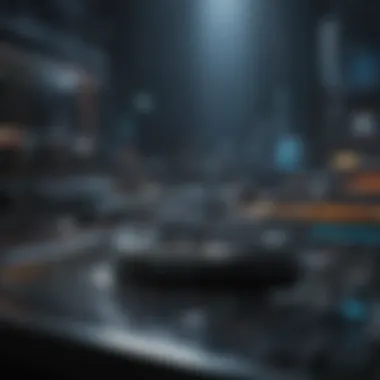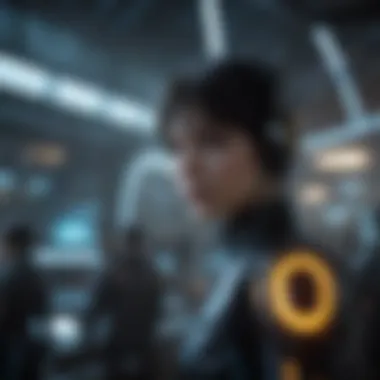Exploring the Soundtrack of Tron Legacy


Intro
In the realm of modern film scores, the soundtrack to Tron Legacy has carved out a unique space. Composed by the electronic duo Daft Punk, the music not only complements the futuristic visuals of the film but also establishes a soundscape that resonates with audiences on multiple levels. This exploration will delve into the intricate layers of Daft Punk's work, revealing how it intersects with both narrative and culture, whilst enriching the cinematic experience.
Artist Profile
Biography and Background
Daft Punk, formed in 1993 by Thomas Bangalter and Guy-Manuel de Homem-Christo, emerged from the vibrant Parisian music scene. Their music blends house, techno, and disco, marked by a distinctive sound that has garnered a dedicated following. The duo wrapped themselves in anonymity, choosing to don helmets and gloves, which allows their music to take center stage.
Their decision to compose the Tron Legacy score demonstrates a departure from their usual track-based production, embracing a narrative form that enhances the film's storyline. This move signaled their evolution as artists, expanding their creative boundaries beyond mere club anthems.
Major Influences and Inspirations
Daft Punk's influences are varied and profound, reflecting a historical tapestry in both electronic music and cinematic compositions. Listening to their works reveals the footprints of artists like Kraftwerk, whose innovation in electronic sound laid the groundwork. In addition, scores from film composers such as John Williams and Ennio Morricone have shaped their understanding of how music aids storytelling.
Within the context of Tron Legacy, Daft Punk drew inspiration not only from the aesthetics of the original 1982 film but also from the broader themes of digital technology and virtual realities. The very essence of the film demands a score that feels expansive and otherworldly, a quality that Daft Punk delivers with exceptional precision.
Song Analysis
Theme and Lyrics Breakdown
Unlike traditional songs, the Tron Legacy soundtrack does not focus heavily on lyrics; instead, it capitalizes on mood and atmosphere. Each track builds an emotional arc that complements the visual elements of the film. For instance, "Derezzed" energizes the audience with pulsating beats and rapid tempos, symbolizing the frenetic pace of the digital universe.
Thematically, the music navigates between light and dark, mirroring the internal and external conflicts of the film. Tracks like "The Grid" pulse with optimism and adventure, while "Son of Flynn" explores a more melancholic tone, rooted in loss and searching.
Instrumentation and Composition
Daft Punk employed a plethora of instruments in creating this score. Synthesizers dominate the sound palette, creating a futuristic aura. Additionally, orchestral elements add depth to the electronic sound, blending both worlds seamlessly. Strings, brass, and even choirs emerge at strategic moments, intensifying key scenes and emotional beats.
Notable compositional choices include:
- Layering: The intricate layering of synths with traditional orchestral elements adds richness.
- Rhythmic complexity: Varied rhythms reflect the chaotic nature of the digital universe.
- Dynamic contrasts: Sudden shifts in volume and intensity keep the audience engaged and on edge.
"The music is not just an accompaniment; it’s a character in its own right that drives the narrative forward."
Ending
The soundtrack of Tron Legacy, crafted by Daft Punk, is a monumental achievement, integrating electronic music with the grandeur of orchestral arrangements. It achieves more than mere accompaniment; it serves as a narrative device and a cultural commentary, resonating in a time when technology and humanity remain in a delicate balance. This analysis highlights not only the artistry of Daft Punk but also the soundtrack's significant contribution to both the film it accompanies and the broader landscape of contemporary music.
Understanding Soundtracks
In the world of film, soundtracks are more than just background noise; they possess the power to mold an audience's experience, guiding their emotions and perceptions throughout the narrative. The soundtrack viewed through the lens of Tron Legacy serves as an excellent illustration of how music can elevate a storyline. Understanding soundtracks involves recognizing their multifaceted role in film – as a vehicle for storytelling, a means of creating mood, and even as a character in its own right.
Music in film has evolved significantly over the years and can be viewed as a tapestry interwoven with the visual aspects of the work. Without it, the viewing experience would often lack depth and resonance. In Tron Legacy, for instance, Daft Punk’s distinctive electronic sounds do not just accentuate the visual spectacle but also immerse the audience into the digital world crafted by the filmmakers. The marriage of image and sound can provide subtext, hinting at underlying themes or foreshadowing events.
Moreover, understanding soundtracks aids in grasping how they reflect cultural shifts and technological advancements. In the case of Tron Legacy, the soundtrack isn't just a sonic accompaniment; it's a commentary on the intersection of humanity and technology, brilliantly encapsulated through Daft Punk’s work. Their sound waves ripple throughout the film, much like the light trails left by the inhabitants of the Grid, drawing connections between emotions and the digital age.


The Role of Music in Film
Music in a film acts as an emotional compass, steering the audience's reactions without them even realizing it. Think of a thriller—one moment of silence before a score ramps up can send chills down your spine, setting the stage for that impending jump-scare. In Tron Legacy, the pulsating rhythms woven into the scenes help establish a thrilling atmosphere, effectively pulling the audience deeper into the cinematic experience.
The score transcends mere accompaniment; it enhances narrative arcs and character developments. For example, key moments in the film feature music that evolves alongside the characters' journeys, reflecting their triumphs and struggles. A brilliant score can make a simple scene feel monumental. Without the soaring, hypnotic melodies of Daft Punk, sequences that introduce high-stakes battles or emotional confrontations might feel less impactful, an echo of the visual spectacle without the resonance of sound.
Evolution of Soundtrack Genres
The landscape of soundtrack genres has seen incredible shifts since the advent of sound in films. While orchestral scores dominated early cinema, the rise of technologies and shifts in audience preferences paved the way for diverse genres. Electronic music, prominently showcased in Tron Legacy, began to permeate soundtracks during the late 20th century. As technology grew, composers started experimenting with new sounds, reflecting not just the on-screen action but also broader cultural influences.
Electronic soundtracks often capture the mood of modern narratives. They make a statement about the film's aesthetic, infusing it with a contemporary vibe. When looking at the evolution towards techno and synth-heavy compositions, films like The Matrix and Blade Runner provide earlier examples that laid the groundwork for Tron Legacy's bold musical choices.
As audiences embrace these shifts, today's film scores reflect the complexity of modern storytelling. Soundtracks are no longer merely about complementing visuals; they are crucial in expanding the narrative universe, leading to a more immersive experience. The soundtracks of today are a testament to how genres have evolved, showcasing how music can serve as a bridge between the viewer's emotions and the film's overarching themes.
The Cultural Significance of Tron Legacy
The 2010 film, Tron Legacy, not only serves as a sequel to the original Tron from 1982 but also revitalizes a franchise that has captivated audiences for decades. The cultural significance of Tron Legacy stretches beyond its narrative; it delves into how the unique melding of visual and auditory elements shapes the viewer's experience. This soundtrack, crafted by the electronic music pioneers Daft Punk, becomes a character in its own right. The music mirrors the film's themes, exploring the intersection of technology and humanity, while simultaneously influencing the broader film and music industries.
Franchise Background and Its Impact
When Tron first hit theaters, it was groundbreaking in its use of computer-generated imagery and a narrative focused on the digital realm. Fast forward nearly three decades, and Tron Legacy emerged against a backdrop of vast technological progression. The film not only reintroduces audiences to the digital frontier but also bridges generational gaps, inviting both newcomers and long-time fans into its sweeping narrative.
The cultural importance is evident in its impact on the aesthetics of future films and its fusion of music and visuals. Daft Punk's involvement brought a mainstream accessibility to electronic music in cinema, challenging traditional film scores that had been predominantly orchestral. Their sound becomes the lifeblood of the film, helping to construct moods that range from exhilarating to haunting.
In many ways, Tron Legacy reignited discussions around virtual realities and our interactions with technology, relevant themes even today. This franchise not only entertains but educates, making it significant in discussions about the digital age.
Themes Explored in Tron Legacy
The narrative of Tron Legacy delves deep into themes of isolation, identity, and the dichotomy of man versus machine. At its core, it reflects on the choices that technology forces us to make. The protagonist, Sam Flynn, embarks on a quest to rescue his father from a digital prison, highlighting familial bonds amidst technological entrapment.
Soundtrack components contribute to these themes in vital ways, enhancing emotional depth through rhythm and melody. The music whispers feelings of yearning, victory, and even despair as characters navigate this complex world. Daft Punk's ability to weave different styles in their compositions mirrors the journey through the digital landscape:
- Pulsating electronic beats signify moments of conflict.
- Melodic strings evoke nostalgia and connection to the human experience.
- Dark, ambient tones reflect the stark isolation of the digital realm.
Through this sonic landscape, Tron Legacy communicates visually and narratively compelling themes, making its cultural presence profound.
"The music becomes a bridge between the emotional experience of the characters and the audience, facilitating a connection that transcends the screen."
Daft Punk: A Revolutionary Duo
Daft Punk's contribution to the electronic music scene goes beyond just catchy beats and innovative sounds; it's a cultural phenomenon that reshaped listener’s expectations of what a soundtrack could accomplish. The duo, consisting of Thomas Bangalter and Guy-Manuel de Homem-Christo, brought their unique flair to a genre often seen as club-focused, persuading audiences and critics alike to look at electronic music from fresh perspectives. In the context of Tron Legacy, their sound transformed the auditory experience of the film into something remarkably vibrant and engaging. The music was not merely a background element; it was as crucial as the visuals in establishing the film's tone and atmosphere.
Origin and Evolution of Their Sound
Daft Punk started crafting their distinct electronic sound in the 1990s, when their early works like "Homework" pushed boundaries and challenged mainstream music. They blended house, funk, and techno influences by manipulating samples and introducing innovative production techniques. The evolution of their sound is marked by a continuous exploration of new genres while maintaining a signature balance of rhythm and melody, which resonated deeply with audiences.
Their journey into sound design began with the creation of layered textures that envelop listeners in an otherworldly experience. The synthesis of synthetic beats and organic sounds gives their tracks a warm, inviting quality that is rare in electronic music. In the case of Tron Legacy, they embraced orchestral elements alongside digital instrumentation, weaving an intricate tapestry of sound that mirrors the film's narrative complexities.


This evolution is evident in standout tracks such as "Derezzed", where pulsating rhythms interplay with ethereal synths, encapsulating the vibrancy and energy of the film's universe, showcasing the duo’s ability to evolve while staying utterly true to their roots.
Collaborations and Influences
Over their career, Daft Punk’s collaborative spirit has been a defining characteristic, allowing them to innovate and draw from a diverse range of influences. They have worked with various artists across genres, including Pharrell Williams and Nile Rodgers, to craft tracks that are both commercially appealing and artistically significant. These partnerships have expanded their reach and enriched their sound palette, making it inevitable that their work would be pivotal for projects like Tron Legacy.
The musical landscape that influenced Daft Punk is as eclectic as their collaborations. They harnessed inspirations from 70s disco, funk, and rock while keenly studying music from around the globe. Their decision to incorporate orchestral arrangements in the Tron Legacy score reflected their admiration for cinematic soundscapes, marrying it with their hallmark electronic style.
"Daft Punk's music is the heartbeat of Tron Legacy, bringing the digital world alive as never before."
Their ability to merge these various musical elements speaks to their revolutionary impact on modern music, demonstrating how an artist can thrive at the intersection of genres. This allows not just a wider audience to appreciate the score but also sets a new bar in how soundtracks are conceived in relation to visuals.
In concluding this section about Daft Punk, it's clear that their revolutionary essence is reflected in both the tone of Tron Legacy and the broader electronic music scene. Their work serves as a masterclass in the integration of technology and art, affirming Daft Punk's status as vanguards of a new era in music.
Unpacking the Tron Legacy Soundtrack
The Tron Legacy soundtrack holds a special place in the realm of film music. It represents a bold leap in how music can interact with and enhance visual storytelling. Composed by the electronic music duo Daft Punk, this soundtrack is not just a collection of tunes; it is a fundamental pillar of the film's emotional and narrative framework. The significance of dissecting this soundtrack lies in understanding how Daft Punk melded their unique sound with cinematic techniques that elevate both the film and the music itself.
Key Tracks and Their Significance
Within the broader context of the soundtrack, specific tracks stand out due to their thematic depth and emotional resonance. Each key track serves as a narrative anchor, guiding audiences through the film's various arcs. For instance:
- Derezzed: This high-energy track serves as a musical representation of conflict and a sense of urgency. Its sharp electronic beats encapsulate the action-packed scenes within the film, making it pivotal for the viewer's experience.
- End of Line: This track emphasizes a more melancholic yet hopeful tone. Its synth-driven melodies accompany some of the film's quieter, introspective moments, providing a contrast to the more frenetic tracks.
- Tron Legacy (End Titles): The final track serves as a retrospective gaze, tying together the film's themes of sacrifice and legacy. The composition combines orchestral elements with electronic beats, embodying the duality present in the film itself.
These key tracks are not merely auditory experiences; they carry significant narrative weight, enriching the storytelling of Tron Legacy.
Musical Composition Techniques
To grasp the intricacies of the Tron Legacy soundtrack, it becomes essential to delve into the musical composition techniques employed by Daft Punk. The duo seamlessly interweaves electronic sounds with orchestral textures to create a soundscape that is both futuristic and nostalgic. Notable techniques include:
- Layering Synths: By layering various synthesizer sounds, Daft Punk crafts a rich auditory experience that immerses the listener in the film's cybernetic world.
- Utilizing Dynamics: Changes in loudness create a sense of tension and release, echoing the on-screen conflicts. For instance, the soft introduction to certain tracks swells into powerful crescendos mirroring the film’s climactic moments.
- Rhythmic Complexity: The use of complex rhythms and syncopation gives a modern edge to the traditionally structured film score, which may appeal to younger audiences and electronic music aficionados alike.
These techniques not only underline Daft Punk’s innovative approach but also create a compelling atmosphere that enhances the visual narrative of Tron Legacy.
Integration of Sound and Visuals
The synergy between sound and visuals is perhaps one of the most remarkable aspects of the Tron Legacy experience. This integration is not haphazard; it is meticulously crafted to ensure that each sound complements the visual cues of the film. Key points to consider include:
"The music in Tron Legacy doesn’t just accompany the visuals; it breathes life into them, creating a feedback loop where sound and sight feed off each other."
- Synchronization: Many musical cues are timed precisely with on-screen actions, enhancing emotional moments. For example, a score's swell might coincide with a pivotal moment of character development or action sequence, leaving a profound impact on the viewer.
- Mood Setting: Specific sounds and tones are chosen to evoke feelings aligned with the film's aesthetics. Darker, heavier tones accompany scenes set within the digital landscape, while brighter melodies resonate during moments of hope.
- Thematic Motifs: Recurring musical themes serve as an audible thread connecting different story arcs, subtly reminding the audience of the characters’ journeys even when they are off-screen.
As a result, the soundtrack becomes an integral part of the viewing experience, enriching both the narrative and emotional impact of Tron Legacy. This careful unpacking of the Tron Legacy soundtrack not only reveals the artistic choices behind the music but also showcases the innovative spirit that defines Daft Punk's work.
Reception and Impact
The reception of the Tron Legacy soundtrack holds significant value, serving as a testament to its ability to resonate with both audiences and critics. The partnership between Daft Punk and the film’s narrative resulted in a compelling auditory experience that complemented the visual lure of the movie. Examining the critical acclaim and audience reactions reveals not only the artistry involved in the musical creation but also its enduring cultural relevance in today’s musical landscape.


Critical Acclaim and Reviews
The initial reception of the soundtrack was a mixed bag, with some critics lauding its innovative blend of orchestral sounds and electronic music, while others were less enthusiastic. From the outset, notable publications like The Guardian praised Daft Punk's unique approach. They highlighted how the duo bridged the gap between traditional film scores and contemporary electronic music, setting a new benchmark for future soundtracks.
Many reviews emphasized the immersive nature of the score. Some tracks, like "Derezzed" and "The Game Has Changed," were singled out for their ability to heighten the film's tension and drama. These moments effectively matched the film’s high-octane visuals, creating a seamless fusion of imagery and sound.
"The sweeping synths and pulsating beats of the soundtrack breathe life into a digital world, echoing the film's themes of creation and destruction."
– Critic's Review
Beyond technical execution, critics noted how the score captured the emotional depth of the film’s narrative. The more somber tracks evoke a sense of nostalgia, as if yearning for something lost in the digital age. This emotional resonance did not go unnoticed, with many reviewers recognizing the soundtrack as a pivotal character within the film itself.
Audience Reception and Legacy
Audience reception varied, yet there was a palpable excitement surrounding the soundtrack, particularly among fans of Daft Punk. In online forums and social media, listeners expressed enthusiasm, often sharing personal interpretations of how the music resonated with their experiences. The soundtrack, for many, became intertwined with their memories of viewing the film, creating a lasting impression.
As the years passed, Tron Legacy's soundtrack evolved beyond its film roots, impacting genres like electronic and pop music. Some fans could be seen debating the influence on platforms like Reddit, where discussions sprung up about how the style employed by Daft Punk enriched the soundscape of modern electronic music.
The soundtrack has not only been well-received but also considered a benchmark in the film score landscape, influencing upcoming musicians. Its ability to blend orchestral elements with electronic sound has paved the way for a new wave of soundtracks aiming to strike a balance. The legacy of the soundtrack continues to echo, marking a significant era in both electronic music and cinematic history.
Influence on Modern Music
The impact of Tron Legacy's soundtrack extends far beyond the silver screen, reaching deep into the veins of modern music and reshaping its contours. As the musical landscape evolved in the decade since, Daft Punk’s unique blend of electronic melodies and orchestral elements opened doors that many contemporary composers and musicians now stride through confidently.
Trends in Electronic Music Post-Tron Legacy
In the wake of Tron Legacy's release, there’s been a noticeable shift in the realm of electronic music. The film’s score did more than just accompany visuals; it set a benchmark for a new sound that echoes in modern production techniques. Other artists and producers began to draw inspiration from Daft Punk's creation, leading to the emergence of several notable trends:
- Orchestral Integration: A significant number of electronic artists began to incorporate orchestral arrangements into their music, creating a rich, layered sound that resonates with both the heart and mind. Tracks reminiscent of Derezzed reflect this amalgamation of styles, merging synthetic beats with grand strings.
- Atmospheric Soundscapes: Inspired by the immersive qualities of the Tron Legacy soundtrack, many musicians have turned to creating vast, atmospheric pieces. They seek to transport listeners, just as Daft Punk did in the film, using ambient pads and cinematic buildup that draws upon the thematic elements of uncertainty and exploration.
- The Rise of Synthwave: Another trend stemming from the soundtrack is the rise of the synthwave genre, which further fuses nostalgic synth sounds with modern production. Many synthwave artists cite Daft Punk as a main influence, as they emulated the retro-futuristic vibe that Tron Legacy encapsulated so well.
"The music feels like an entity itself within the story, rather than just a background element."
This perspective of music as a narrative vehicle akin to the visuals serves as a beacon for upcoming artists.
Soundtrack Influence on Video Game Music
Following the buzzing reception of Tron Legacy, the influence on video game music became particularly pronounced. Game soundtracks started exploring a breadth of emotions and soundscapes that mirrored Daft Punk's approaches, leading to advancements that played crucial roles in shaping narratives and player experiences:
- Cinematic Score: The orchestration and depth employed by Daft Punk encouraged game developers to invest in more cinematic scores, enhancing emotional engagement. Titles like The Last of Us and Final Fantasy XV reflect this trend, where the music feels intricately tied to the gameplay.
- Electronic and Ambient Layers: Many new video games began to experiment with synth-heavy tracks and atmospheric layers, taking cues from the ethereal qualities found in Tron Legacy. Games such as Cyberpunk 2077 utilize heavy electronic influences, creating a sound that’s both immersive and reflective of the game's narrative.
- Interactive Music Experiences: The nonlinear nature of gameplay led to innovative approaches in sound design. Developers sought to create dynamic soundtracks, paralleling how Daft Punk utilized sound in Tron Legacy, leading to music that adapts to the player's actions or decisions, enhancing the overall gaming experience.
In summary, the ripple effect of Tron Legacy's soundtrack continues to foster evolution in modern music and video game soundtracks. The trends initiated by Daft Punk’s groundbreaking score are not merely echoes of the past; they signal an enduring legacy that enriches and inspires today's musical innovators.
The End
The conclusion of an analysis doesn’t merely wrap up the previous discussions; rather, it distills the essence of the entire topic into a narrative that resonates with its audience. In the case of the Tron Legacy soundtrack, it symbolizes more than just a collection of music tracks. This section will underscore the enduring influence of Daft Punk’s work in shaping both the immediate and long-term soundscapes of cinema and beyond.
The Enduring Legacy of Tron Legacy's Soundtrack
Daft Punk’s soundtrack for Tron Legacy has not only captured the spirit of the film but has also created ripples across various music genres. It represents a significant turning point in how film scores can evolve beyond traditional boundaries. The film's atmosphere and storytelling benefited greatly from the rich layers and textured compositions intricately designed by the duo.
The use of electronic music in film soundtracks has been heightened since the release of Tron Legacy. Here are some notable aspects of its legacy:
- Innovative Sound Design: The blend of orchestral elements with digital sounds offered a new template for future composers looking to utilize technology within their scores.
- Cultural Influence: The soundtrack introduced many to a more symphonic style of electronic music, influencing a generation of musicians and producers. Names like Zedd and Hans Zimmer have later drawn on similar techniques, showcasing the film’s long-lasting impact.
- Sound in Modern Media: Video game music has also seen a transformation; many game developers now look to cinematic scores, inspired by how Tron Legacy integrated visuals with compelling sound.
"Music is the shorthand of emotion." – Leo Tolstoy
This quote aptly sums up the emotional core of Tron Legacy’s soundtrack. Daft Punk has managed to embed deep emotional resonance within their tracks, enriching the viewing experience by elevating scenes with tailored musical cues.
In summation, the importance of this particular soundtrack extends far beyond its immediate reception. It has etched itself into the annals of music history, carving a niche where technology and artistry converge. This sustained influence serves as a reminder of the potential soundtracks hold in shaping narratives not just in film, but also in cultural consciousness at large.







